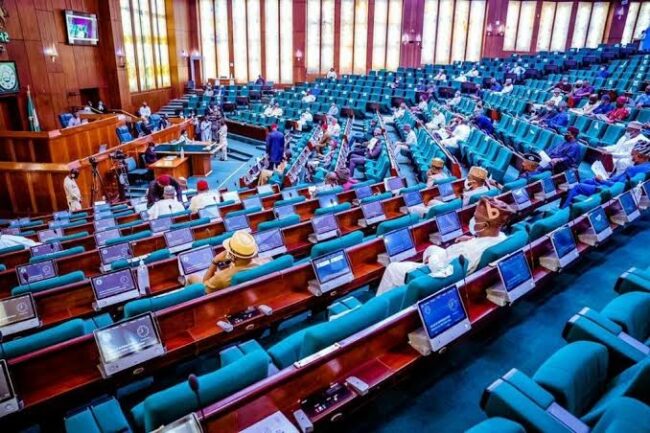On Tuesday, the House of Representatives immediately halted the signing and implementation of the ‘Enhanced Trade and Investment Partnership (ETIP) agreement between Nigeria and the United Kingdom aimed at exploring new opportunities in key sectors, namely the energy, legal, and financial services sectors.
The resolution was passed after the adoption of a motion sponsored by the Minority Leader, Hon. Kingsley Chinda, and 48 others who solicited the House intervention in response to public outcry over the terms and conditions of the proposed agreement.
In his lead debate, Hon. Chinda expressed concern over the “recent reports and public outcry over an alleged economic and trade partnership between the United Kingdom (UK) and Nigeria aimed at exploring new opportunities in key sectors such as the energy, legal, and financial services sectors.
“The House also notes that the trade deal became very heightened some days ago as the legal aspect appeared lopsided and tilted mainly in favour of the UK to the detriment of qualified Nigerian lawyers in that it seeks to allow UK lawyers to enter the Nigerian legal space and practice but not vice versa.
“The House is aware that under the trade deal referred to as ‘Enhanced Trade and Investment Partnership (ETIP),’ the British Business and Trade Secretary, Kemi Badenoch, and Nigeria’s Minister for Trade and Investment, Doris Uzoka, were to sign an agreement on behalf of their respective countries last week in Nigeria.
“The House is also aware that it was also reported that under the Trade Partnership, Nigeria committed herself to work towards removing barriers that prevent UK lawyers from practicing international and foreign law in Nigeria.
“The House is further aware that while the deal seeks to foster collaboration between the film and media industries in the UK and Nigeria, it does not cater for the interests of Nigerian lawyers as there are no such provisions or opportunities for them to practice their trade in the UK.
“The House is cognizant of the fact that while it is good for Nigeria to enter into partnership deals with other countries for the purpose of unlocking future opportunities and thus contributing towards boosting the country’s economy, such deals must be seen to promote, preserve, and protect the interests of the generality of Nigerians.
“The House is also cognizant that, in furtherance of its law-making powers under Section 4 of the Constitution of the Federal Republic of Nigeria, 1999 (as amended), the National Assembly has a duty to inquire into matters such as this in the overall interest of the country and the citizenry.
“The House is further cognizant of the fact that following the public outcry over the said trade deal, the Nigerian Bar Association (NBA), through its president, Yakubu Markyau (SAN), issued a statement questioning the legality of the legal services aspect of the deal and calling for a halt to its signing and implementation.
“The House is concerned that the statement issued by the NBA may have reassured Nigerian lawyers and doused the tension and controversy generated by the alleged trade deal. It is apparent that there was insufficient consultation with key stakeholders and affected interests with respect to the deal.
“The House is also concerned that there is an urgent need for this House (the Legislature) to investigate the said trade deal between the UK and Nigeria with a view to ascertaining the terms and conditions thereof.
“The House is worried that unless immediate pragmatic steps are taken to investigate and address this issue, the country may unwittingly be entering into a deal whose terms and conditions may in the long run be unfavourable to the country and the overall interest of Nigerians,” he said.
In its bid to ensure accountability, the House urged the Federal Ministry of Industry, Trade, and Investment to immediately halt the signing and implementation of the trade partnership with the UK until the terms and conditions governing the same are fully examined and ascertained.
To this end, the House mandated its Committee on Treaties, Protocols, and Agreements to investigate the matter and report back within four weeks for further legislative action.
ALSO READ THESE TOP STORIES FROM NIGERIAN TRIBUNE
